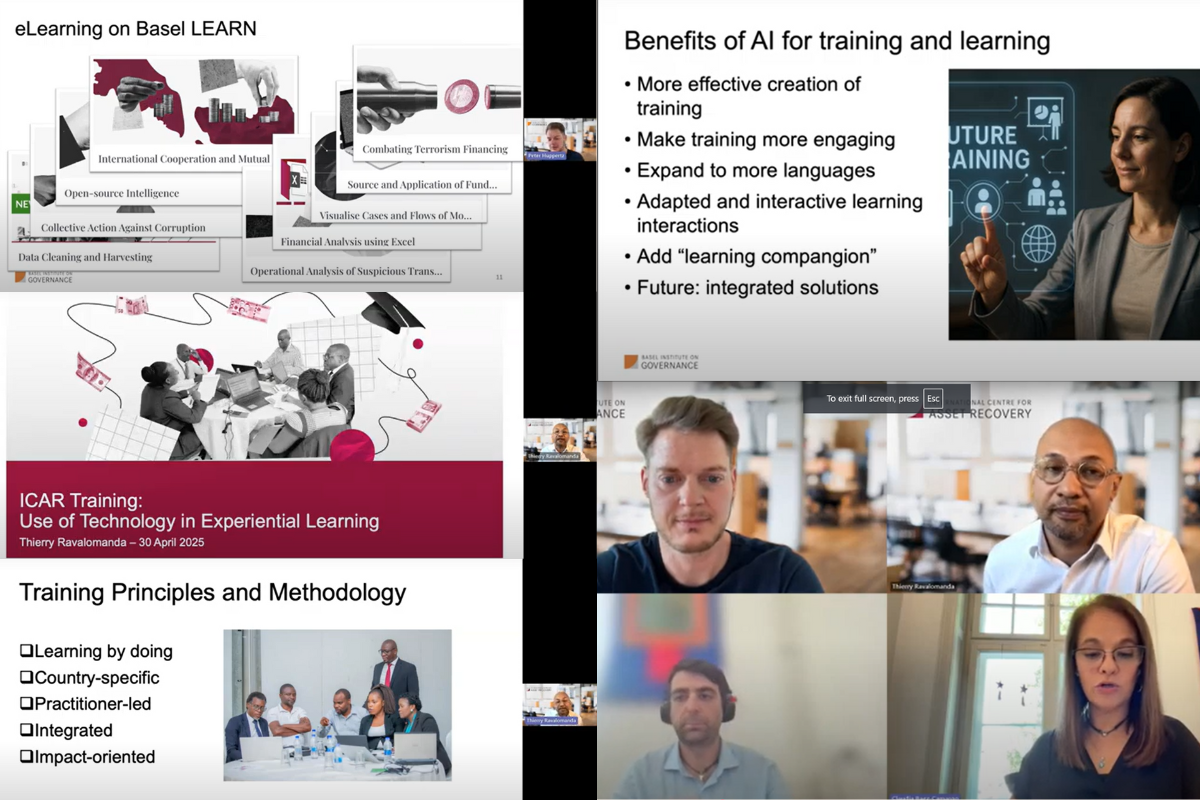Enhancing law enforcement training with technology and AI

As corruption becomes more sophisticated, anti-corruption training must keep pace. In a recent webinar, experts from the Basel Institute shared insights on how technology has strengthened training efforts for law enforcement practitioners worldwide. They also explored exciting new applications of artificial intelligence (AI) to further enhance training and learning experiences.
This webinar was provided in support of the FALCON project*, showcasing technological tools and best practices to aid the Fight Against Large-scale Corruption and Organised Crime Networks. As Jacopo Costa, Senior Specialist in Prevention, Research and Innovation, explained, one of FALCON’s key objectives is to explore how technology and AI solutions can be leveraged to innovate the fight against corruption.
eLearning: from passive reading to engaged learning
Peter Huppertz, Head of IT and eLearning, offered a number of recommendations on how to make eLearning effective and efficient for learners. Central to his message was that the delivery is as important as the content.
“Too much online learning is passive and disconnected from practitioners’ real-life tasks and needs.”
The Basel Institute’s eLearning method is built around active participation – and technology is crucial to this learning method. Participants complete simulated investigations step by step on the Basel LEARN platform. They must complete certain tasks correctly in order to progress to the next phase of investigation.
Peter demonstrated these interactive features by taking webinar participants through a few steps of our popular Open Source Intelligence (OSINT) course. His demonstration showed how the learning journey is supported by content taken from actual cases that expose participants to what they need to do in real life. By developing courses in collaboration with subject matter experts, we ensure that the materials reflect real investigative mechanisms rather than abstract theories.
At its best, eLearning offers remarkable flexibility and individualisation. Once a programme is developed it can be easily scaled up (Basel LEARN now reaches nearly 60,000 users). By employing open source software, the learning management system can be tailored to the specific needs of the training programme. This is especially useful when we deliver our custom-made in-person, in-country training programmes for law enforcement and other anti-corruption practitioners.
Blended learning – the best of both worlds
Blended learning – combining instructor-led, in-person training and self-paced eLearning – has become a cornerstone of our training programmes, which have seen more than 4000 participants in over 40 countries over 17 years.
These training programmes are targeted at government agencies in partner countries to help them develop their capacities on financial investigation and asset recovery. They have been designed to mirror the complexity of real investigations, where investigators search for evidence by analysing financial data and untangling complex legal structures, hidden ownership and cross-border flows.
In our trainings, participants investigate a corruption case, uncovering pieces of evidence by locating information and replicating the procedural and legal steps from their own jurisdictions. Thierry Ravalomanda, Head of ICAR Training, explained that this approach enhances participants’ sense of ownership and autonomy. These are critical motivation factors in adult learning.
In the past, these simulated investigations were paper-based. Now, with the Basel LEARN platform integrated into our face-to-face training, participants are able to immerse themselves into more realistic investigative environments. They are also able to continue to learn and practise their skills once the training ends.
Importantly, the human aspect is still central in our trainings. They are delivered by experienced investigators, prosecutors and financial intelligence analysts who provide guidance as participants work their way through the investigative scenarios. Participants also always work in groups with the LEARN platform, fostering cross-agency collaboration. As Thierry noted:
“We need everyone – FIUs, prosecutors, judges and law enforcement – to speak the same language and understand the investigative process together”.
Taking blended learning a step further
Blended learning will also be a key aspect of our new postgraduate programmes, presented during the webinar by Jörg Schmidt, Senior Specialist, Continuing Education. Delivered in partnership with the University of Basel, the programmes combine academic foundations with new research and real-world practitioner experience.
Much of the degree courses will be delivered online, with hybrid introduction and conclusion sessions. Hence, the courses will draw on the Basel Institute’s extensive experience with eLearning and blended learning. They will employ technology to ensure that online modules are interactive, collaborative and closer to real-world experiences.
Expanding educational frontiers: the possibilities of AI
AI is already being explored by the Basel Institute as a valuable enhancement for eLearning and on-site training.
For example, Peter demonstrated a new AI-generated witness interview course activity, which replaces the traditional written interview summary document. The activity allows training participants to actively engage with AI-prompted witnesses by posing questions and receiving realistic responses – a step closer to a real-life interview. As the technology improves, we will integrate this model in other training programmes, for example in our training on interviewing skills for financial investigators.
Apart from enhancing participant engagement, AI is also useful for creating training content and eLearning courses. It can assist in creating content such as quiz questions and translating trainings into different languages. It can also help with assessing participant performance, which provides valuable data on the effectiveness of our courses.
Technology-supported training enhances effectiveness
Basel Institute eLearning courses and training programmes have demonstrated the effectiveness of digital tools in training anti-corruption professionals around the world. As technology becomes more powerful, it can help us to provide better training to tackle the increasingly complex and evolving landscape in which law enforcement and other anti-corruption practitioners work.
Claudia Baez Camargo, Director of our Prevention, Research and Innovation team, who moderated the webinar, concluded the session with these words:
“It shouldn't be about people just becoming lazy and using AI rather than doing their work. It is about making people more productive. It is about us being able to deliver more complex, more sophisticated tools that go with our training, that go with our teaching, that make the experience a lot more immersive and interesting than it would otherwise be.”
Learn more
- Watch the webinar recordings.
- Read the FALCON policy brief “Recommendations for leveraging Artificial Intelligence (AI) in the fight against corruption”.
*The FALCON project is funded by the EU HORIZON programme under grant agreement 101121281. The Basel Institute's participation is funded by the Swiss State Secretariat for Education, Research and Innovation (SERI).



